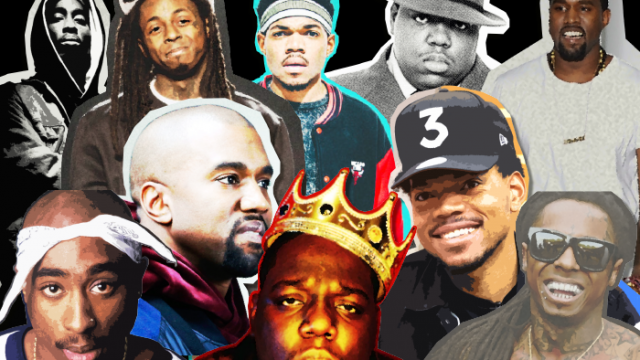I was first introduced to rap music through the arresting lyrics of Tupac Shakur’s posthumous single “Ghetto Gospel.” The song, which features samples from Elton John’s “Indian Sunset,” is a lyrical reaction to racial difference and the perpetuating marginalization that results from poverty. It is a plea to end, in the words of Tupac, the “war in the streets.” Years later, I came across Tupac’s “Hit ‘Em Up,” an aggressive collaboration with other ’90s rappers, in which Tupac raps “Now it’s all about Versace, you copied my style / Five shots couldn’t drop me, I took it, and smiled / Now I’m bout to set the record straight with my AK / I’m still the thug that you love to hate.” With over 3 million more YouTube views on “Hit ‘Em Up” than “Ghetto Gospel,” it is clear that, until now, it has been the greedy and aggressive side of Tupac that is most popular in society. And this is not without warrant. While aggressive, the Tupac of “Hit ‘Em Up” projects a power that, for many, is alluring, even promising. It is a power derived from wealth, physical strength, notoriety, and intimidation. It is a power that oppresses more than it exalts, that prefers stagnation to progression. But it is power, nonetheless; as of late, however, it is a power that rap culture, as a reflection of changing social tides, has turned its back on.
And where better to note the prevalence of this societal 180 than in the verses of the once notoriously crude—now still crude but apparently God-fearing—Lil Wayne?
In early October, Lil Wayne released Gone ‘Til November, a book compilation of prison diary entries from his time spent at Rikers Island. The entries reflect a raw poeticism that is at once vulgar in its language (Lil Wayne has never been one to shy away from profanities) and graceful in its honesty. While pondering the possibility of rapping in God’s name, Lil writes, “It would be way bigger than having a million m*****f*****s walking around with tattoos every-d***-where with dreadlocks or saying s*** like ‘bling-bling.’ I would truly have the power of having pop culture turn to God. I would have straight killers in church every Sunday.” This is not the Lil Wayne of the Tha Carter albums that we have come to know and, yes, despite some of his heinous lyrics, love. This is a reflective Mr. Carter, a conscious Mr. Carter with a sense of social obligation. This is the Mr. Carter of a new generation of rap music, spearheaded by Chance the Rapper, supported by Kanye West, and reflective of Tupac’s good fight.
In Kanye’s song “Ultralight Beam,” Chance rejects a power derived from money and notoriety in the name of a power with its roots in lyrical affect: “He said let’s do a good ass job with Chance three / I hear you gotta sell it to snatch the Grammy / Let’s make it so free and the bars so hard / That there ain’t one gosh darn part you can’t tweet.” The presence of these lyrics in a mainstream rap album that is destined to be a bestseller suggests a wider move toward artistic integrity and away from monetary preoccupations.
In his own song “How Great,” an excitedly religious, pop-culture infused hybrid of church hymn and soft rap, Chance raps “Hear, for I will speak noble things as entrusted me / Only righteous, I might just shrug at the skullduggery / I couldn’t stand to see another rapper lose custody / Exalt, exalt, glorify.” A couple of things are happening in these lines. First, Chance calls for recognition of the rapper’s word as valid and consequential. He then, like the Tupac of “Ghetto Gospel,” pledges to move against the perpetuation of marginalization by rejecting the preoccupations of the aggressive, arrogant rapper (Chance often raps about his love for his daughter). Lastly, in just three words, Chance reflects the intentions of many rappers today: to exalt, rather than oppress; to shed light, rather than darkness.
The rappers and re-made rappers of the new generation reflect a societal shift from power-hunger to social obligation. Lil Wayne is right when he posits that rap culture has the ability to turn pop culture. If the new generation succeeds in this aim, then we will find ourselves in a society that is, in the words of Biggie Smalls, “all good, baby, baby.”
Featured Image by Kelsey McGee / Heights Editor













